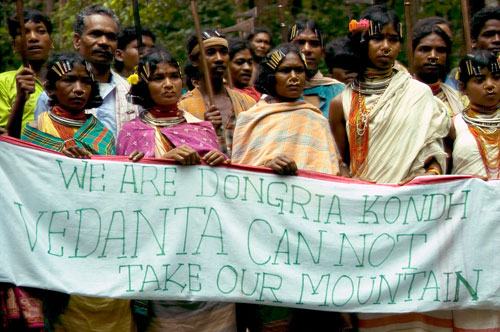|
|
The South
Asian Life & Times - SALT |
|
|||
|
Contents Adventure
Art
-
Dongria Kondh
|
|
||||
|
Dongria Kondh
“To the
Dongria, Niyam Dongar hill is the seat of their god, Niyam Raja. To Vedanta
it is a $2billion deposit of bauxite.”
The Dongria Kondh have lived in Niyamgiri for
thousands of years and their lifestyle and religion have helped nurture the
area’s dense forests and unusually rich wildlife. The Dongrias worship the
top of the mountain as the seat of their god and protect the forests there.
Vedanta Resources wants to mine the bauxite from the top of the same
mountain. Vedanta has been trying to mine Niyamgiri’s bauxite
since 2003. The company built a refinery at the foot of the hills before
getting legal clearance to mine. Kinari village was completely destroyed to
make way for the refinery. Over one hundred families were moved to a
settlement known locally as the ‘rehab colony’ - a walled compound of
two-room concrete houses, circled with barbed wire. The villagers lost both
their land and their means of supporting themselves. Pollution from the
refinery caused health problems, livestock diseases and crop damage. The
Odisha government’s pollution control board found emissions from the
refinery to be ‘alarming’ and ‘continuous’. In 2012, the refinery was closed
due to lack of bauxite. In April 2013 the Supreme Court of India ordered
consultations amongst the tribal members and told Vedanta that the Dongria
would decide whether to allow mining or not – on the basis that their
religious, cultural and social rights would be jeopardized if mining were to
go ahead.
In
August 2013 the Dongria Kondh overwhelmingly rejected plans by Vedanta
Resources to mine bauxite in their sacred Niyamgiri Hills. Twelve Dongria
villages voted unanimously, against Vedanta’s bauxite ambition.
It
was an unprecedented triumph for tribal rights. The results of the
consultations will now be considered by India’s Ministry of Environment and
Forests, who will have the final say on the mine. The Dongria have been praised for their resilient
determination to save their Hills. Survival International and its supporters
have backed the Dongria’s fight by staging protests, recruiting the support
of celebrities such as Joanna Lumley and Michael Palin, and bringing the
tribe’s struggle to worldwide attention. Vedanta’s treatment of the Dongria
was slammed by the British government, amongst others, and several
shareholders such as the Church of England pulled out of the company on
ethical grounds.
|
|||||
|
Copyright © 2000 - 2014 [the-south-asian.com]. Intellectual Property. All rights reserved. |
|||||
